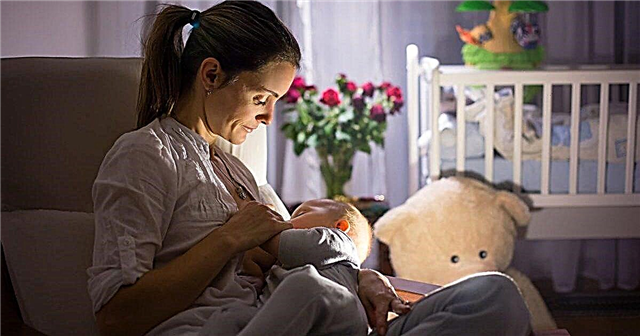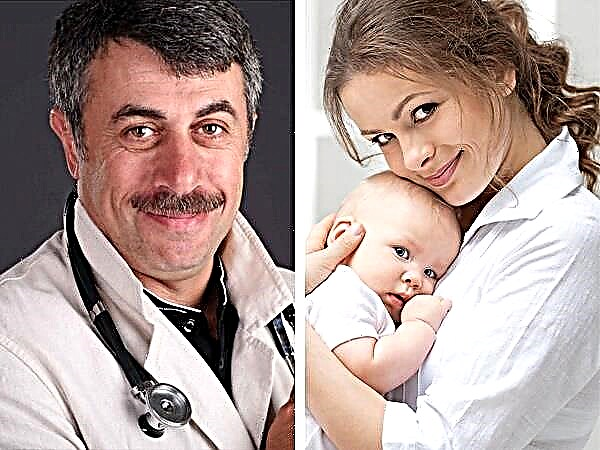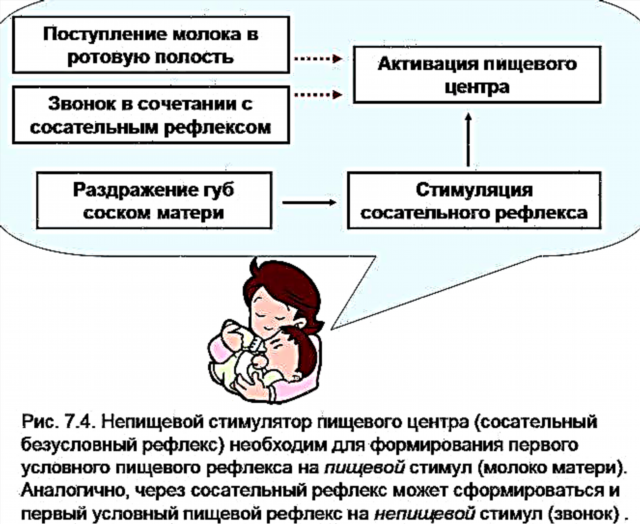There is nothing better for a nursing infant than breast milk. By nature itself it is arranged so that it has everything necessary for the full development of the baby. Mothers are fed day and night, so that their child grows and gains strength. Frequent feeding at night means a lack of adequate sleep for the nursing mother herself, and she needs to rest in order to preserve breast milk. How to wean a baby from breastfeeding at night but keep lactation? When is it better to wean a baby completely without compromising his health?

Night feedings
How to wean a child from eating at night
Before weaning a baby and looking for ways not to breastfeed the baby at night, you need to make sure that the baby is psychologically ready for this. Also, the mother should be ready for this, who, during the feeding of the baby, established a strong emotional connection with him. It may well be that she is not yet ready to break it.
Benefit or harm
In the first months of his life, a breastfed baby eats quite often - every 2-3 hours it must be applied to the breast. This is important for the child himself - only in this way he receives food. Also, latching to the breast stimulates the synthesis of hormones responsible for milk production. The hormone prolactin is produced especially intensively at night during breast stimulation. Therefore, in the period up to six months, pediatricians do not recommend canceling night feedings if the mother wants to keep breastfeeding.
The baby can wake up for feeding at night several times. One is enough for one time, another requires 2-3 or more. For a separate category of children, nighttime meals are mandatory, this applies to premature babies and children with insufficient weight gain. For them, pediatricians recommend establishing a clear feeding regimen and observing the established interval of 3-3.5 hours.

A close emotional bond is formed between mom and baby
Weaning the baby gently at night
The opinion of pediatricians about night feedings is as follows: night awakenings are typical for all children in the first year of life and are not a deviation from the norm. But after a year, most often in one and a half, children do not feel the physiological need for night food. This means that it is possible and necessary to gradually wean the baby from nighttime "snacks" so that he begins to wean from them. How can you wean a baby from breastfeeding at night? To do this, you can use the following recommendations:
- gradually reduce the volume of night feedings, adjust, i.e. to minimize the time spent at the breast at night;
- during a nightly awakening, try to put him to sleep again, without giving a breast; try motion sickness and lulling;
- feed your baby well during the day so that you don't feel hungry at night; do not skip feeding, control how much by volume he eats during the day;
- it is advisable to teach the baby to sleep separately, in his bed; when he wakes up next to his mother, he will instinctively look for his chest in order to fall asleep in a familiar environment;
- teach yourself to fall asleep (to poetry, fairy tales or lullabies), and not during the last evening feeding.
Pediatrician E. Komarovsky's recommendations
The advice of a well-known children's doctor boils down to the following: the child who spent the whole day in the fresh air, literally "exhausted" from new impressions, played enough and had a hearty dinner in the evening, will sleep well at night. A tired and well-fed baby will not wake up at night, he simply will not need to do this. He received all the attention from his parents and the necessary nutrition during the day. It is also good to organize a cool bath for the baby in the evening before going to bed, after which you can nourish him. After that, he will sleep for at least 6-7 hours. During this time, parents will be able to sleep well.

Pediatrician advice
Important! For a good sleep for the whole family, it is necessary to organize cool and humid air in the room. Temperature - in the range of 20-22 ° С, humidity - 40-60%.
When to wean from breastfeeding
According to the WHO recommendation, it is advisable to keep breastfeeding for up to two years. The benefits of breast milk do not decrease with the age of the child. It is still rich in nutrients and elements that form the baby's immunity.
Stopping breastfeeding means that the baby will receive food in a different way. Gradual weaning begins when complementary foods are introduced into the baby's diet: vegetable and fruit purees, dairy products, cereals and juices. Complementary feeding usually begins at six months of age. The very process of mastering new products occurs in stages, gradually and carefully. Only by the eighth month can we say that one feeding is replaced by complementary foods without harming the baby.
Excluding one feeding, one cannot talk about a full replacement of milk with an adult meal. Leaving a baby without breast milk at eight months would be wrong. The optimal solution would be a smooth weaning, if life circumstances permit. To do this, it is necessary to teach the child to fall asleep without latching to the breast, so that this does not become a decisive factor in maintaining lactation for a long time.

It is important to teach your baby to sleep in his crib without breast
There is a rather deeply rooted myth that it is impossible to wean a baby in summer. The reason for this statement is the fact that stopping breastfeeding increases the risk of intestinal infections. In fact, subject to basic hygiene rules, this risk is minimal and does not depend at all on the season. With free access to clean water, electricity and a refrigerator, it will not be difficult to prepare quality and safe food for your baby. Therefore, it does not matter in principle at what time of the year it is better to wean the child from breastfeeding.
When not to wean
If the child has neuropsychiatric diseases, allergies, a strong growth spurt or pronounced stress reactions, the abolition of breastfeeding should be postponed for a more favorable time. His suffering should not be aggravated.
Important information! Breastfeeding should not be stopped after a prophylactic vaccination when the body is susceptible to infections.
If it is not possible to continue breastfeeding for medical reasons, the mother needs to take medications that are incompatible with lactation, or she needs to go to the hospital, feeding has to be stopped abruptly, without preparation. In this case, the best way is to replace the breast with a bottle of infant formula. The child needs to be given increased attention from loved ones in order to extinguish possible tantrums in the absence of a mother.

Abrupt weaning is the strongest stress for the baby
At any age, weaning from the mother's breast familiar to the baby will be a strong shock. Although this cannot be done without it, sooner or later it will happen, it is better to wean it gradually, protecting the child and the whole family from emotional distress.



